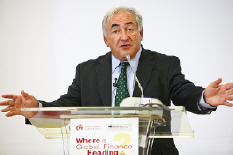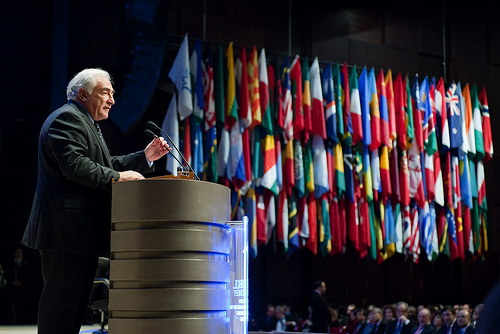
Strauss-Kahn said that low-income or slow economic growth increases the risk of a country falling into civil conflict. (photo: IMF)
The IMF and Civil Society
Economic Stability and Peace – Role of the IMF
November 2, 2009
In a speech delivered in Oslo, IMF Managing Director Dominique Strauss-Kahn urged policymakers to focus on economic stability to help underpin world peace.
Last October 23th, IMF Managing Director Dominique Strauss-Kahn talked about an important topic—the relationship between economic stability and peace. In his view, these two are intimately entwined: if you lose one, you are likely to lose the other. He emphasized the fact that peace is a necessary precondition for trade, sustained economic growth, and prosperity. “When the nations of the world come together to address common challenges in a spirit of solidarity, we can attain a virtuous circle of peace and prosperity, and avoid a vicious circle of conflict and stagnation”, Strauss-Kahn argued. During his speech, he also mentioned the fact that the global economic recovery was no accident, but rather the result of bold and coordinated policy action taken by leaders around the world.
Risk of Social Unrest
Strauss-Kahn reminded the audience that the current global crisis was the deepest and broadest since the Great Depression, and that the bold decisions taken by policymakers worldwide were instrumental for the economic recovery we are seeing now. “In the face of crisis, countries came together to face common challenges with common solutions, focusing on the global common good. We saw this in fiscal policy, in monetary policy, and in financial sector policy”, Strauss-Kahn said.
He continued explaining why peace is a necessary precondition for sustained economic growth. For example, in many areas of the world, there is potential risk to higher unemployment or lower purchasing power. Unfortunately, economic marginalization and destitution are catalysts for social unrest, political instability, breakdown of democracies and even war. Strauss-Kahn told the audience that, in a sense, the IMF’s collective efforts to fight the crisis cannot be separated from its efforts to guard social stability and to secure peace.
IMF as First Responder
The IMF played its part in the multilateral response to the current crisis, promoting the global public good of economic stability. “Our goal is now to adapt to the needs of the post-crisis world by helping countries maintain or consolidate economic stability,” Strauss-Kahn said. However, to be effective, the Fund must be seen as legitimate.
Last September, the G-20 moved the institution forward, pledging to shift quota shares toward dynamic emerging markets and developing countries by at least five percent from over-represented to under-represented countries.
Strauss-Kahn ended his speech by saying “recent decisions by the Group of Twenty (G-20) industrialized and emerging market countries gave a strong signal that multilateralism is here to stay. And now we have a historic opportunity to adapt it to a post-crisis world because the peace of our planet depends on it.” 
IMF’s Managing Director Dominique Strauss-Kahn speaking at the IMF and World Bank 's 2009 Annual Meetings Opening Plenary Session at the International Congress Center in Istanbul, Turkey October 6,2009. IMF Staff Photo/Thomas Dooley
